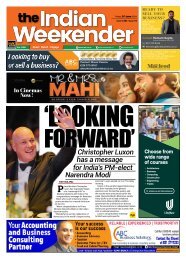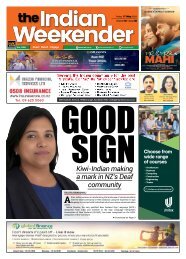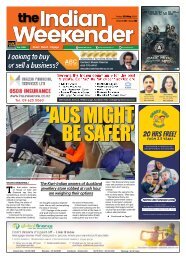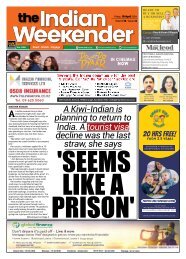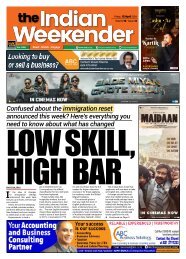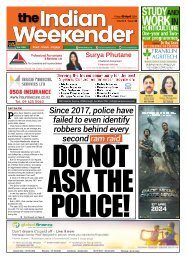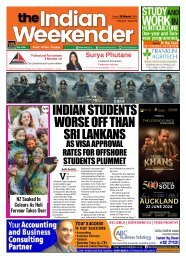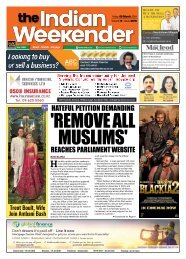The Indian Weekender, 11 June 2021
Weekly Kiwi-Indian publication printed and distributed free every Friday in Auckland, New Zealand
Weekly Kiwi-Indian publication printed and distributed free every Friday in Auckland, New Zealand
Create successful ePaper yourself
Turn your PDF publications into a flip-book with our unique Google optimized e-Paper software.
6 NEW ZEALAND<br />
Friday, <strong>June</strong> <strong>11</strong>, <strong>2021</strong><br />
<strong>The</strong> <strong>Indian</strong> <strong>Weekender</strong><br />
BRYCE EDWARDS: Political<br />
Roundup – Jacinda Ardern’s<br />
opaque government by PR<br />
DR BRYCE EDWARDS<br />
One of the most important, and scathing, critiques of<br />
Jacinda Ardern’s Government was published this<br />
week by senior political journalist Andrea Vance. She<br />
reveals how the current administration has become adept and<br />
determined at keeping information secret and the public in the<br />
dark about crucial issues. You can read her piece here: This<br />
Government promised to be open and transparent, but it is an<br />
artfully-crafted mirage.<br />
<strong>The</strong> gist of Vance’s column is that this Government portrays<br />
itself as open, and has promised much more transparency, but in<br />
reality is doing its upmost to prevent the media and public from<br />
having access to information and scrutinising what it is doing. She<br />
says, “In my 20-year plus time as a journalist, this Government<br />
is one of the most<br />
thin-skinned<br />
and secretive I have<br />
experienced.”<br />
Vance<br />
points to<br />
ministers such as Nanaia Mahuta who won’t give interviews<br />
on important topics (except for exclusives with “cherry<br />
picked” journalists) and the refusal to reform the Official<br />
Information Act. She also says the Government feeds journalists<br />
with virtually meaningless press conferences that do not<br />
serve the public interest and are distractions from what is<br />
actually important.<br />
Her column follows on from several other highly-critical<br />
columns by Vance over the last year or so, in which she has<br />
challenged the popular narrative about the Government’s<br />
communication techniques.<br />
For instance, during the Covid crisis last year, while many were<br />
in thrall to the Prime Minister’s use of daily press conferences<br />
to convey information to the public, Vance pointed out how<br />
unsatisfactory the media events were for journalists who actually<br />
needed much more information, arguing that Ardern’s forums<br />
left many questions unanswered – see: How Jacinda Ardern is<br />
using soft propaganda to beat Covid-19.<br />
More recently, in March Vance criticised the Government’s<br />
communications about the Covid-19 vaccine rollout, arguing “the<br />
flow of information about the programme is tightly controlled, and<br />
heavily politicised” – see: Covid-19 vaccine rollout is a secretive,<br />
sluggish spin-fest.<br />
In her latest column, Vance identifies a big part of the problem<br />
as being the increased number of communications staff hired<br />
by government to massage the media and produce good public<br />
relations: “We are up against an army of well-paid spin doctors.<br />
Since the current Government took office, the number of<br />
communications specialists have ballooned. Each minister<br />
has at least two press secretaries. (Ardern has four). In the<br />
year Labour took office, the Ministry for the Environment had<br />
10 PR staff.<br />
"<strong>The</strong>y now have 18. <strong>The</strong> Ministry for Foreign Affairs and<br />
Trade more than doubled their staff – up to 25. MBIE blew<br />
out from 48 staff to 64.” She points out that the rebranded NZ<br />
Transport Agency, now Waka Kotahi, has increased its PR staff<br />
from 26 to 72.<br />
Vance’s column parallels my own column for the Guardian,<br />
published about 18 months ago, in which I suggested that<br />
politicians on both sides of the divide had become too dependent<br />
on their spin doctors – see: New Zealand’s year of style<br />
over substance.<br />
I pointed to the rise of PR and communications as an industry<br />
that is overshadowing journalism: “New Zealand now has many<br />
more public relations practitioners than journalists.<br />
<strong>The</strong> latest census results show about 8000 people work in PR,<br />
greatly overshadowing the roughly 1600 journalists working in<br />
print and broadcasting. Other calculations have put the ratio of<br />
PR-to-journalists at 10:1. Many of the PR professionals work<br />
directly for the politicians, government departments, or local<br />
government authorities.”<br />
For more on the general increase in consultants and contractors<br />
in government agencies see Phil Pennington’s Police, Defence<br />
Force and Transport Agency contractor spending up by at least<br />
15%. According to this, “Oranga Tamariki’s review shows its<br />
communications team exploded, from 16 staff to 35, with the<br />
salary bill doubling to $3.6m.”<br />
Ministry of Health public relations<br />
<strong>The</strong> Ministry of Health provides an excellent case study in how<br />
government departments deal with the provision of information<br />
to the public. Vance writes that communications<br />
staff in Health are “notorious for stymieing even<br />
the simplest requests. Health’s information<br />
gatekeepers are so allergic to journalists they<br />
refuse to take phone calls, responding only<br />
(and sporadically) to emails.”<br />
This week has seen the Ministry of Health<br />
told off by Public Service Commissioner<br />
Peter Hughes for damaging the department’s<br />
public reputation in its handling of a report on<br />
mental health.<br />
Communications staff had removed important<br />
information from the report, and significantly delayed its release<br />
– see Henry Cooke’s Public service watchdog won’t hold inquiry<br />
into mental health report, but criticises Ministry of Health for<br />
harming public confidence.<br />
This followed on from media investigations that revealed the<br />
quite extraordinary story of how senior officials battled for two<br />
years to remove data from a report on mental health, seemingly<br />
because it made the government look bad.<br />
You can see the original article by Henry Cooke here: ‘A lot<br />
of data and negative statistics’: Inside the battle behind dramatic<br />
edits and huge delays to a Government mental health report.<br />
<strong>The</strong> restructuring of the health system means there is a greater<br />
need for information and debate. But current members of district<br />
health boards probably won’t be participating, as they have<br />
been gagged by the Public Service Commission (previously<br />
the State Services Commission), which has implemented a new<br />
code of conduct to prevent health board members from making<br />
“political comment” – see Cate Broughton’s Ban on DHB<br />
members making political comment may prevent criticism of<br />
health reforms.<br />
Blogger No Right Turn has hit out at the ban, pointing to the<br />
fact that most of the board members are elected: “so political<br />
comment is literally their job, just as it is for local authority<br />
members.<br />
And this sort of gag order is simply completely inappropriate.<br />
It’s like trying to gag MP’s. But then, control-freak Labour is so<br />
afraid of criticism they’d probably try that if they thought they<br />
could get away with it” – see: An inappropriate gag.<br />
<strong>The</strong> Ministry of Health is also criticised by the Otago Daily<br />
Times’ Elspeth McLean, who at the end of last year, shared<br />
some of her experiences in trying to get information from the<br />
communications staff there, which she sums up like this: “the<br />
Ministry of Health has long been intent on playing down anything<br />
controversial, dragging out any response to any questions<br />
delving under the surface as long as it can” – see: Public deserves<br />
openness, respect.<br />
Arguments against Andrea Vance<br />
Not everyone is pleased with Andrea Vance’s column this<br />
week. Labour Party activists and supporters have taken issue<br />
with her critique of Ardern’s opaqueness, arguing it’s not as bad<br />
as she suggests.<br />
Writing on the Labour-friendly blog <strong>The</strong> Standard, Greg<br />
Presland chides Vance for not putting all the positive things about<br />
the Government’s record in her column, concluding “attacks on<br />
the Government without providing very important context is not<br />
something an independent media engages in” – see: Openness<br />
and transparency.<br />
On issues such as Nanaia Mahuta not giving interviews about<br />
China, Presland argues: Vance “did not seem to comprehend that<br />
the same week that Mahuta was planning to release reports on<br />
the future of the country’s drinking water may not have been a<br />
great time to seek time for an interview about China. I suspect<br />
it was not planned. It was just that Mahuta did not have enough<br />
hours in the day to contemplate an interview.”<br />
An even more hostile account is put forward by activist<br />
Gerard Otto, who concludes: “Vance wrote a lazy article for lazy<br />
minds who do not think critically and who are easily mislead<br />
by any old opinion from a bitter, twisted and vengeful media” –<br />
see: Andrea’s artfully crafted mirage.<br />
As well as putting forward several justifications for why<br />
the Labour Government might not want or be able to be fully<br />
transparent, Otto provides some useful counter-evidence about<br />
compliance with Official Information Act: “Did you know that<br />
by the 2nd half of 2018 – 95% of all Official Information Act<br />
requests were completed on time under Labour, compared with<br />
only 91% in 2015/2016 under National?”<br />
Finally, about a year ago, Stuff put together a useful article<br />
of who are the powerful comms staff behind the politicians in<br />
the Beehive – see: Inside the spin-room: Who is who in the<br />
Government’s PR team.<br />
Dr Bryce Edwards is Political Analyst in Residence at<br />
Victoria University of Wellington. He is the director of the<br />
Democracy Project.





